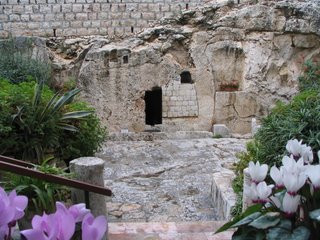 I have taken a keen interest in the gospel of John lately which is mainly due to the fact that my church has been going through it. However one theme seems to run through the Gospel that I never picked up on before. I think, it will be easiest for me to speak about the theme like this:
I have taken a keen interest in the gospel of John lately which is mainly due to the fact that my church has been going through it. However one theme seems to run through the Gospel that I never picked up on before. I think, it will be easiest for me to speak about the theme like this: There sits on my desk a small pot. It is black with gold lettering. Inked in this gold lettering is the verse found in Romans 6, which says "Therefore we have been buried with Him through baptism into death in order that we too may live a new life". When I wrote this verse on the pot (probably, some product of a school or church craft time), I thought it was comforting - a novel reminder of a life renewed in Christ. For, just as He found himself emerging from the grave in the new garb of victory, so too are we promised to return with Him.
Yeah totally... a pot...with dirt... a pot; a chintzy reminder of a truth I didn't fully grasp.
Then I stumbled upon John 19, and I noticed something curious about the narration toward the end.
At a lunch meeting with a friend this week, I made him chuckle with the description of John as the ancient minimalist. I said this because John often only alludes to his point or leaves in the subtext key information for deciphering the message of his gospel. I believe this is happening at the end of chapter 19. In this portion of John, the writer tells us that Joseph of Arimathea and Nicodemus, the secret friends of Christ, took charge of Jesus' corpse. They prepared it for burial, wrapped it, and then (interestingly!) laid it in a garden near Golgotha. I knew John wouldn't have wasted the paper or ink to tell us that Jesus was in a garden unless it was essential. Then, the words of Jesus came ringing back to me. He said that a seed could never grow unless it first was buried and died, and I began to see that John's emphasis on the location of Jesus' burial was no mere coincidence (paraphrase John 12).
The garden was the only place fitting for Jesus to be placed. It was the only venue conducive to His nature of new life.
Later that day, after my meeting with my friend, I returned and began to wrestle with John 19, turning these ideas over in my mind. As I sat at my desk, I saw the pot with the gold lettering. And when I peered into it, to my utter surprise, there was a small sprout sticking up from the moistened soil, and John's words came rushing back to me - what once was buried and dead sprung into creation with new life and new vigor!
It was a subtle reminder that, for me, in reading/ruminating on John 19, it is only fitting that Christ was buried in the garden near Golgotha. For, just as every new spring reaches forth and extracts from the ground the renewed life of creation, so too did the God of the universe embody His creation, defeat death, and burst from the ground heralding his own triumph, victory, and honor.
Christ's three day germination signaled the beginning of new creation, bound His chosen to irrevocable life, and marked for eternity the end of despair!